Planting 10,000 Trees for Bees
Tree planting is underway as part of our newest project, the Beechworth Honey Bee Arboretum. As part of our commitment to planting 10,000 Trees for Bees over the next 3 years, we are getting our hands dirty and planting trees in a specialist patch of pollinator-friendly Australian trees and shrubs.
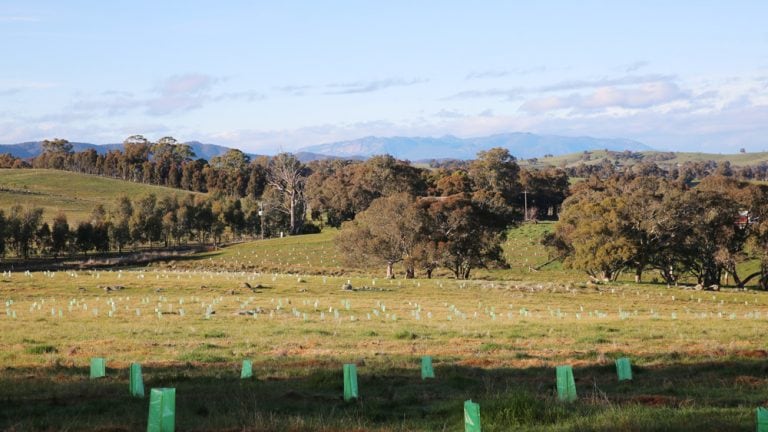
Planting the Beechworth Honey Bee Arboretum
The Bee Arboretum is situated about 4 kms to the west of Beechworth on a dedicated 6 hectare (15 acre) plot of land secured for its purpose. It will contain about 40 species of native plants that are chosen to best support bees and pollinators and will contain around 3000 trees and shrubs when fully planted.
Despite the Bee Arboretum being a passion project it does have some serious purposes. We hope it will:
- Showcase a specialist native plant collection planned and planted specifically to support a diversity of pollinators by ensuring that there is year round flowering.
- Educate people about the nutritional needs of pollinators and encourage pollinator-friendly plantings. Our aim is to have a number of species always flowering.
- As our climate changes, many insects that normally undergo a diapause (period of suspended development due to winter) are having their natural cycles disrupted. We have noticed that honey bees are more active over the winter than ever before due to warmer seasons. They are needing more stores of nectar and pollen as their normal hibernation is disrupted. The Bee Arboretum will have a collection of native plants for bees or insects that are active through winter – some of which are plantings that would normally not grow in our area but whose growth can be tested as our climate changes. With climate change we know we need to think differently about plantings.
- Plant the seeds and grow a site that sparks the interest of current and future generations about the need for more research into bees, native pollinators and native flora and how they adapt in various climates. The Bee Arboretum will be a site for future data collection and maybe new careers and futures in science.
- Connect and join native flora corridors – filling in the gaps for birds & pollinators to safely traverse the landscape.
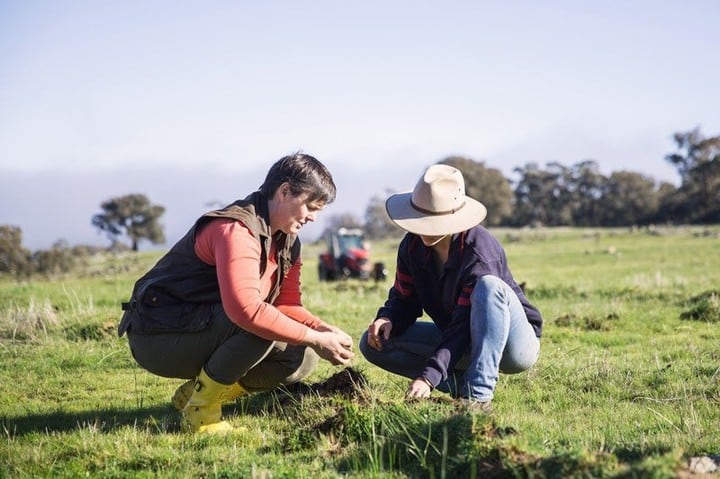
Jodie & Gab Goldsworthy at the Bee Arboretum site
Tree planting is underway
Throughout July in 2020, we prepared the soil and spent our spare time in the morning fog and winter sun planting our beautiful little seedlings. There is nothing more soul-enriching than spending time in nature.
Over the winter of 2020 we planted 1500 trees and shrubs in the Bee Arboretum. This will be coupled with the great work of our partners, the Beechworth Urban Landcare & Sustainability Group, who are planting trees we have donated all across our district as we work towards our goal of 10,000 trees for bees.
We have been approached by Trust for Nature to use the Bee Arboretum to conduct an annual bird count. Data gathered will demonstrate the benefit of the plantings for birds. We are looking forward to seeing the science demonstrate just how beneficial trees are to attracting more birds as the trees grow and the coexistence of all the various species reliant on native flora.
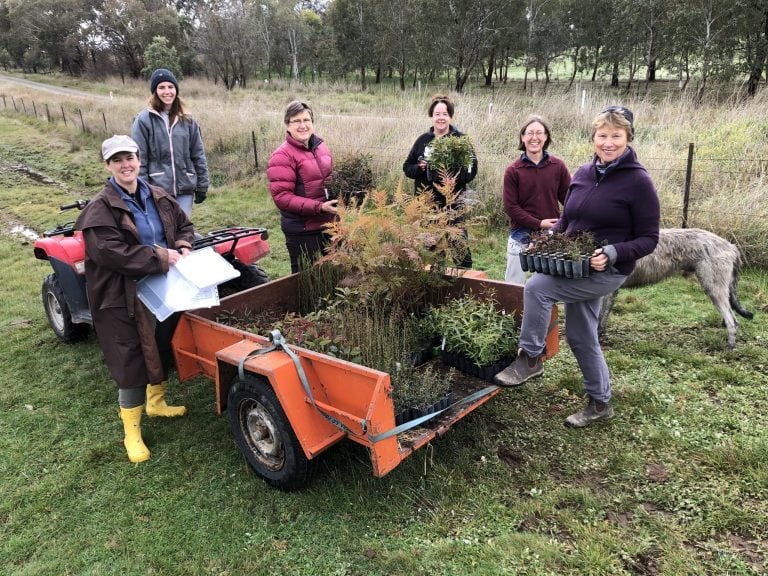
Beechworth Urban Landcare & Sustainability Group helping with planting the Bee Arboretum.
Planning for the arboretum
In planning for the Bee Arboretum we consulted many sources which allowed us to identify around 40 species suitable for the development of a bloom calendar that ensured 3 or more flowering plants at any given time. Species were chosen for both their nectar and pollen producing characteristics. Eucalypts were selected for their exceptional honey production capacity and value to the Australian beekeeping industry. We also selected a range of trees and shrubs that would not normally be found in our area to test their ability to adapt as our climate changes and becomes more like the climates they originate from.
Thanks to the Sustainable Farms Project, Wheen Bee Foundation, ANU’s Power Pollinators, Trees for Bees New Zealand – A guide to Planting for Bees, Dr Douglas Sommerville NSW DPI – Honey and Pollen Flora of South Eastern Australia and the Victorian Department of Sustainability & Environment – Reedy Creek Local Native Plants List.
Here is the list of trees we are planting and details of when the trees and shrubs flower. Please remember that these plants are being planted in a test environment and may not be suitable for all climates and areas.
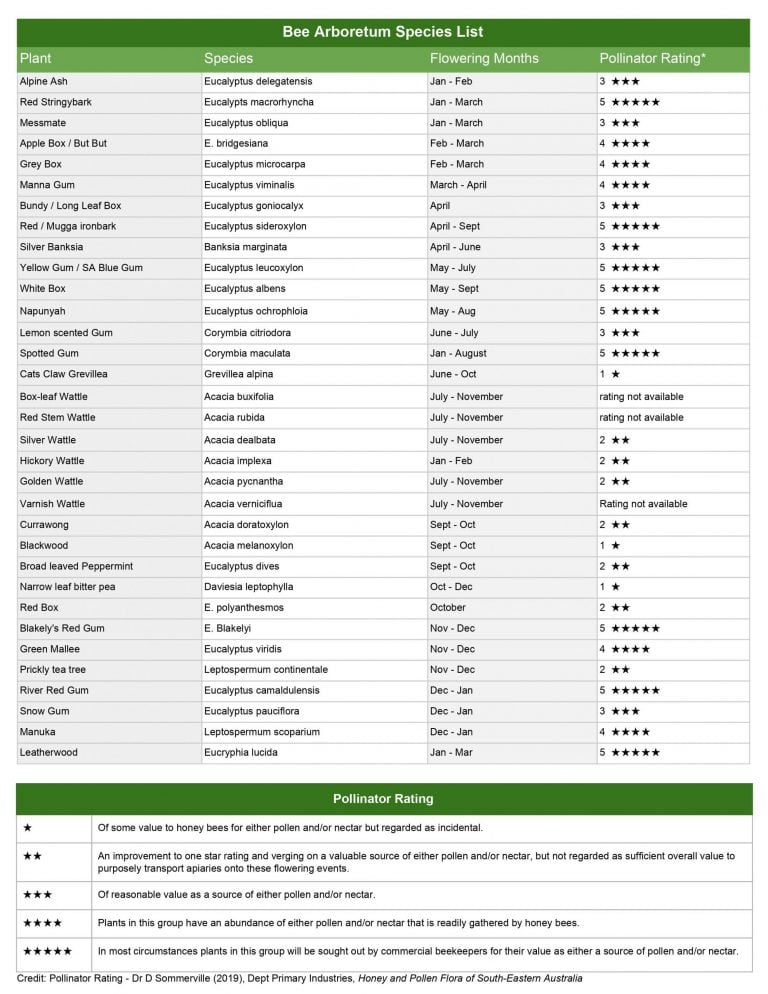
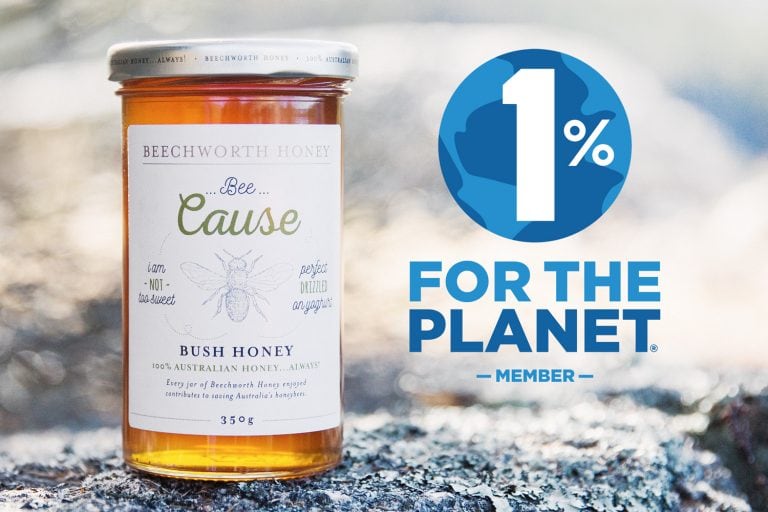
Bee Cause Honey is a 1% for the Planet member
Here’s how Bee Cause has been contributing to the welfare of bees:
- Partnered with Beechworth Urban Landcare & Sustainability Group to plant 10,000 trees for bees over the next 3 years.
- Funding for the Wheen Bee Foundation, Australia’s only registered not-for-profit charity that promotes awareness of the importance of bees for food security, and raises funds for research that addresses the national and global threats to bees.
- Advocating for improved biosecurity and action on climate change to protect bees and their environment.
- Member of the global environment alliance 1% for the Planet.
- We are empowered to do this through support from people like you. Here’s how you can contribute to Bee Cause:
Educate yourself — learn why buying 100% Australian honey is critical to our future food security, and find out about ways you can advocate for the welfare of bees. - Plant trees and a bee friendly garden, full of plants that provide pollen and nectar for pollinators.
- Buy 100% Australian honey and support the Australian beekeeping industry.
- Support directly the initiatives of our not for profit partners, they are listed on our website and are doing great work for bees and the environment.
Bees are the workers that make our world go round and our future is very closely tied to their survival.
Thanks for reading to the end. Sometimes we have a lot to say! Wishing you all the very best.

